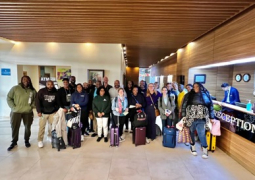
Madam Faye was speaking during the opening ceremony of National Multi - Stakeholder Consultation on Business and Human Rights.
The ceremony was held at a local hotel in Kololi and it was attended by the NHRC and International IDEA staff, environmentalists and Civil Society Organisations (CSOs).
She said the call for businesses to respect and uphold human rights is a competitive advantage and not just a legal or moral obligation.
"We are encouraged by this initiative taken by the National Human Rights Commission which seeks to start a national dialogue on business and
human rights by popularising the UN Guiding Principles, facilitating dialogue, knowledge sharing and collaboration among stakeholders with the hope that The Gambia will adopt a National Action Plan and the enactment of legislation to this effect, " she added.
She explained that the role of business in promoting human rights goes hand in hand with its long-term success as research has shown that companies with strong human rights practices are more resilient, enjoy better employee satisfaction, and attract customers who are increasingly socially conscious.
Furthermore, she said businesses that respect human rights are less likely to face costly legal battles, damage to their reputation, or disruptions to their supply chains.
However, she indicated that challenges remain in many cases, as businesses continue to prioritise short-term profits over long-term sustainability, leaving human rights concerns sidelined.
According to her, this, coupled with weak enforcement of laws creates an environment ripe for exploitation. "It is therefore extremely crucial that businesses, governments, and civil society organisations effectively collaborate to ensure that businesses are held accountable."
She mentioned that it is imperative for businesses to: conduct human rights due diligence to identify, prevent, mitigate, and account for how they address their impacts on human rights; engage with stakeholders, including workers, communities, and civil society, to understand the impact of their operations; and ensure transparency in how they manage human rights challenges, fostering trust and accountability.
"The intersection of business practices with human rights has been a focal point of international dialogue, particularly since the adoption of the United Nations Guiding Principles on Business and Human Rights in 2011," she said.
Further, she said these principles outline a framework known as "Protect, Respect, and Remedy", where: States have the duty to protect against human rights abuses; businesses are expected to respect human rights, avoiding infringements on the rights of others; and Human Rights Commission on Business and Human Rights which stands at the intersection of ethics, law, and corporate responsibility.
She informed the gathering that human rights are the bedrock of a just and equitable society, encompassing fundamental freedoms such as the right to life, liberty, security of person, freedom from slavery and torture, and the right to work, to education, and to participate in cultural life. "These rights are not just for governments to uphold; they extend to the private sector as well."
The International IDEA boss said these principles outline a framework known as "Protect, Respect, and Remedy", where: States have the duty to protect against human rights abuses; businesses are expected to respect human rights, avoiding infringements on the rights of others; and importantly, both states and businesses have a duty to ensure access to effective remedy through judicial and non-judicial means for victims of business-related human rights abuses.





